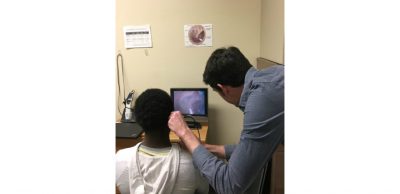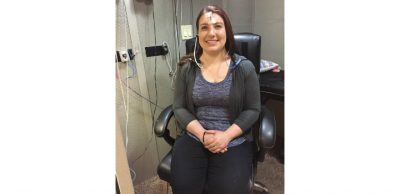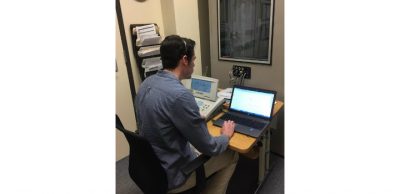Tinnitus Clinic
Director: Dr. Ishan Sunilkumar Bhatt, Ph.D., CCC-A, F-AAA
Clinical audiologist: Dr. Michael Skelton, Au.D., CCC-A, F-AAA
What is tinnitus?
Tinnitus is a perception of ringing, roaring, buzzing, hissing, or any other type of sounds in ears or head in the absence of external sound. About 12 million Americans seek medical attention due to tinnitus.
Why do I have tinnitus?
No one knows for sure why some people experience tinnitus, and some don’t. It can be caused by noise exposure, ear and sinus infections, earwax, thyroid problems, hormonal changes, brain tumors, Meniere’s Disease, heart or blood vessel disease, certain drugs, and often people with hearing loss will experience tinnitus. If you are experiencing tinnitus that is bothersome to you, the first step is to see your doctor to rule out any diseases or earwax buildup.
What can I do about my tinnitus?
There is no known cure for most forms of tinnitus. The majority of people with tinnitus experience relief just from auditory and cognitive interventions. The tinnitus clinic at Northern Arizona University offers:
- Tinnitus assessment
- Individualized preventive counseling
- Individualized management plans
- Referrals and access to Otolaryngologists and behavioral therapists experienced with tinnitus
How is Tinnitus evaluated?
- Audiologic Evaluation: A complete hearing evaluation is performed by an audiologist to determine whether the tinnitus is accompanied by hearing disorders. Testing includes pure tone testing, middle ear function testing, speech recognition testing, and auditory neural function testing. The audiologist will perform tinnitus matching to identify loudness, pitch, and type of sounds you heard in your ears/head.
- Medical Evaluation: An evaluation by an Ear Nose and Throat physicians can be performed to rule out any medically treatable component to your tinnitus. Patients with medically treatable forms of tinnitus will be treated by appropriate medical intervention.
What treatment options are available?
If your tinnitus is not medically treatable, we have two types of treatments are available for the management of tinnitus: Sound Therapy and Behavioral Therapy.
SOUND THERAPY
- Hearing aids: Patients with tinnitus often have hearing loss and hypersensitivity to loud sounds. Hearing aids can help mask tinnitus from your perception and thereby reduce the annoyance. Most patients experience relief from tinnitus through hearing aids.
- Tinnitus Retraining Therapy: This therapy involves ear-level sound generators while producing low-level sounds. Patients with hearing loss and normal hearing can benefit from tinnitus retraining therapy.
- Neuromonics Treatment: Neuromonics devices deliver a pattern of sounds designed to retrain the brain to decrease tinnitus awareness.
BEHAVIORAL THERAPY
- Cognitive Behavioral Therapy: This therapy is delivered by a certified psychologist (Patients will be referred to a psychology clinic). It includes mindfulness-based, acceptance, and commitment therapy to address tinnitus-related distress in daily living.
- Relaxation Exercises: Listening to relaxing music or use of Smart Phone Apps, such as Inner Balance, ReSound Relief, Breathe2relax can induce relaxation and reduce stress, which may decrease the annoyance of tinnitus. These exercises can help to improve your sleep.
Resources
https://www.nidcd.nih.gov/health/tinnitus
Schedule an appointment:
Dr. Ishan Sunilkumar Bhatt, Ph.D., CCC-A, F-AAA
Telephone: 928-523-8345
Email: Ishan.Bhatt@nau.edu





